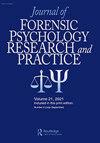The Relationship between Personality Traits and the Effectiveness of Guardian Law Enforcement Training
IF 1.1
4区 心理学
Q4 CRIMINOLOGY & PENOLOGY
Journal of Forensic Psychology Research and Practice
Pub Date : 2022-02-14
DOI:10.1080/24732850.2022.2028392
引用次数: 1
Abstract
ABSTRACT In recent years, there have been efforts to enhance traditional warrior-oriented police academy training with guardian law enforcement curricula that include a focus on building skills related to empathy, respect, and understanding in police-community interactions. Little is known about how officer characteristics influence training effects. Of particular importance, prior studies have not examined the role of personality traits on elements of police law enforcement training that focus on empathy in police-community interactions. This study used a pre-post survey design to examine the relationship between personality traits and police training effects among new recruits in an evaluation of guardian training at the Basic Law Enforcement Academy (BLEA) in Washington State (n = 344). Results indicate that personality traits associated with lack of empathy, as measured by the Self-Report Psychopathy-Short Form (SRP-SF), moderate the effects of training on negative police subculture and guardianship-empathy, with recruits scoring higher on the SRP-SF demonstrating less change (e.g., training effects) within these domains. Implications for police training and discussion of the assessment of personality traits in pre-employment police candidate screening are discussed.人格特质与监护人执法培训效果的关系
近年来,人们一直在努力加强传统的以战士为导向的警察学院培训,其中包括监护人执法课程,重点是在警察与社区互动中培养与移情、尊重和理解相关的技能。很少有人知道军官的特点是如何影响训练效果的。特别重要的是,先前的研究并没有考察人格特征对警察执法培训要素的作用,这些培训侧重于警察与社区互动中的同理心。本研究在华盛顿州基本执法学院(BLEA)的一项监护人培训评估中(n = 344),采用前后调查设计来检验人格特质与警察培训效果之间的关系。结果表明,与缺乏共情相关的人格特质(以精神病态自我报告-短表(SRP-SF)衡量)调节了训练对消极警察亚文化和监护共情的影响,在SRP-SF上得分较高的新兵在这些领域内表现出较小的变化(如训练效应)。本文讨论了在职前警察候选人筛选中人格特质评估对警察培训和讨论的启示。
本文章由计算机程序翻译,如有差异,请以英文原文为准。
求助全文
约1分钟内获得全文
求助全文
来源期刊
CiteScore
1.80
自引率
12.50%
发文量
53

 求助内容:
求助内容: 应助结果提醒方式:
应助结果提醒方式:


